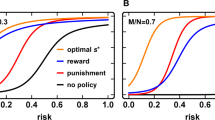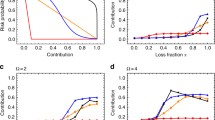Abstract
Climate change represents the largest social dilemma humans have ever faced, where individual actors maximise their personal gain by emitting greenhouse gases into the atmosphere even though this is detrimental to the collective global good. Cooperation on a global scale is urgently required if we are to overcome this problem. However, this is difficult to achieve because cooperators pay the cost of reducing emissions while any benefits are shared between cooperators and free-riders alike. In a risk-free, rational world cooperative behaviour can be promoted through mechanisms that increase the benefit of cooperating relative to free-riding, such as rewards or sanctions. In reality, however, outcomes are seldom certain and humans rarely behave rationally when confronted with risky prospects. Here, we argue that effective policies to mitigate global climate change should incorporate mechanisms to foster cooperation, but also account for both uncertainty and irrational responses that may inhibit collective action.
Similar content being viewed by others
References
Adger N, Aggarwal P, Agrawala S, Alcamo J, Alliali A, Anisimov O, Arnell N, Boko M, Canziani O, Carter T, Casassa G, Confalonieri U, Cruz RV, Alcaraz EdA, Easterling W, Field C, Fischlin A, Fitzharris BB, Garcia CG, Hanson C, Harasawa H, Hennessy K, Huq S, Jones R, Bogataj LK, Karoly D, Klein R, Kundzewicz Z, Lal M, Lasco R, Love G, Lu X, Magrin GJ, Mata L, McLean R, Menne B, Midgley G, Mimura N, Mirza MQ, Moreno J, Mortsch L, Niang-Diop I, Nicholls R, Novaky B, Nurse L, Nyong A, Oppenheimer M, Palutikov J, Parry M, Patwardhan A, Lankao PR, Rosenzweig C, Schneider S, Semenov S, Smith J, Stone J, Ypersele J-Pv, Vaughan D, Vogel C, Wilbanks T, Wong PP, Wu S, Yohe G (2007) Climate change 2007: impacts, adaptation and vulnerability, summary for policymakers. IPCC Secretariat, c/o WMO, 7bis, Avenue de la Paix, C.P. No 2300, 1211 Geneva 2, Switzerland
Barclay P (2010) Altruism as a courtship display: some effects of third-party generosity on audience perceptions. Brit J Psych 101:123–135
Barclay P, Willer R (2007) Partner choice creates competitive altruism in humans. Proc R Soc B 274:749–753
Barrett S (2002) Towards a better climate treaty. (AEI-Brookings Joint Center for Regulatory Studies)
Barrett S, McIlveen R (2009) Negotiating the next climate change treaty. Pol Exch, London
Barrett S, Stavins R (2003) Increasing participation and compliance in international climate change agreements. Int Environ Agreements: Politics Law Econ 3:349–376
Bazerman M, Carroll JS (1987) Negotiator cognition. In: Staw B, Cummings LL (eds) Research in organisational behavior, vol 9. JAI Press, Greenwich, pp 247–288
Boyd R, Gintis H, Bowles S, Richerson PJ (2003) The evolution of altruistic punishment. Proc Natl Acad Sci USA 100:3531–3535
Boyd R, Gintis H, Bowles S (2010) Coordinated punishment of defectors sustains cooperation and can proliferate when rare. Science 328:617–620
Buchan NR, Grimalda G, Wilson R, Brewer M, Fatas E, Foddy M (2008) Globalization and human cooperation. Proc Natl Acad Sci USA 106:4138–4142
Cinyabugama M, Page T, Putterman L (2005) Cooperation under the threat of expulsion in a public goods experiment. J Public Econ 89:1421–1435
Dreber A, Nowak MA (2008) Gambling for global goods. Proc Natl Acad Sci USA 105:2261–2262
Edwards A, Elwyn G, Covey J, Matthews E, Pill R (2001) Presenting risk information—a review of the effects of “framing” and other manipulations on patient outcomes. J Health Comm 6:61–82
Fehr E, Fischbacher U (2003) The nature of human altruism. Nature 425:785–791
Fehr E, Gächter S (2002) Altruistic punishment in humans. Nature 415:137–140
Finus M (2008) The enforcement mechanisms of the Kyoto protocol: flawed of promising concepts. Lett Spat Resour Sci 1:13–25
Fischbacher U, Gächter S, Fehr E (2001) Are people conditionally cooperative? Evidence from a public goods experiment. Econ Lett 71:397–404
Frederick S, Loewenstein G, O’Donoghue T (2002) Time discounting and time preference: a critical review. J Econ Lit 40:351–401
Gagnier D (2010) Climategate: bad science, red herring or political and media football? Policy Options 74–78
Global Humanitarian Forum (2009) Human impact on climate change: the anatomy of a silent crisis. Geneva, Global Humanitarian Forum 116
Goldstein NJ, Cialdini RB, Griskevicius V (2008) A room with a viewpoint: using social norms to motivate environmental conservation in hotels. J Consum Res 35:472–482
Griskevicius V, Cialdini RB, Goldstein NJ (2008) Social norms: an underestimated and underemployed lever for managing climate change. Int J Sust Comm 3:5–13
Griskevicius V, Tybur JM, Van den Bergh B (2010) Going green to be seen: status, reputation, and conspicuous conservation. J Pers Soc Psych 98:392–404
Hamilton WD (1964) The genetical evolution of social behaviour. J Theor Biol 7:1–16
Hardin G (1968) The tragedy of the commons. Science 162:1243–1248
Heffernan O (2010) Constructive communication. Nature Rep Clim Change 4:1
Helm D (2008) Credible energy policy. Pol Exch, London
Henrich N, Henrich J (2007) Cooperation through reciprocity and reputation. In: Why humans cooperate. Oxford University Press, UK, pp 109–132
Henry LA, Sundstrom LM (2007) Russia and the Kyoto protocol: seeking an alignment of interests and image. Glob Environmental Polit 7:47–69
Hilbe C, Sigmund K (2010) Incentives and opportunism: from the carrot to the stick. Proc R Soc B. doi:10.1098/rspb.2010.0065
Hoegh-Guldberg O, Mumby PJ, Hooten AJ, Steneck RS, Greenfield P, Gomez E, Harvell CD, Sale PF, Edwards AJ, Caldeira K, Knowlton N, Eakin CM, Iglesias-Prieto R, Muthiga N, Bradbury RH, Dubi A, Hatziolos ME (2007) Coral reefs under rapid climate change and ocean acidification. Science 318:1737–1742
Janssen MA, Holahan R, Lee A, Ostrom E (2010) Lab experiments for the study of social-ecological systems. Science 328:613–617
Jasanoff S (2010) Testing time for climate science. Science 328:695–696
Kahneman D, Tversky A (1979) Prospect theory: an analysis of decision under risk. Econometrica 47:263–291
Lowe JA, Huntingford C, Raper SCB, Jones CD, Liddicoat SK, Gohar LK (2009) How difficult is it to recover from dangerous levels of global warming? Environ Res Lett 4:1–9
McKibbin WJ, Wilcoxen PJ (2007) A credible foundation for long-term international cooperation on climate change. In: Aldy JA, Stavins RN (eds) Architectures for agreement. Cambridge University Press, Cambridge
Meinshausen M, Meinshausen N, Hare W, Raper SCB, Frieler K, Knutti R, Frame DJ, Allen MR (2009) Greenhouse-gas emission targets for limiting global warming to 2°C. Nature 458:1158–1163
Milinski M, Semmann D, Krambeck HJ (2002a) Donors to charity gain in both indirect reciprocity and political reputation. Proc R Soc B 269:881–883
Milinski M, Semmann D, Krambeck HJ (2002b) Reputation helps solve the ‘tragedy of the commons’. Nature 415:424–426
Milinski M, Semmann D, Krambeck HJ, Marotzke J (2006) Stabilizing the Earth’s climate is not a losing game: supporting evidence from public goods experiments. Proc Natl Acad Sci USA 103:3994–3998
Milinski M, Sommerfeld RD, Krambeck HJ, Reed FA, Marotzke J (2008) The collective-risk social dilemma and the prevention of simulated dangerous climate change. Proc Natl Acad Sci USA 105:2291–2294
Nowak MA, Sigmund K (2005) Evolution of indirect reciprocity. Nature 437:1291–1298
Ostrom E, Walker J, Gardner R (1992) Covenants with and without a sword: self-governance is possible. Am Pol Sci Rev 86:404–417
Raihani NJ, Hart T (2010) Free-riders promote free-riding in a real-world setting. Oikos 119:1391–1393
Rankin DJ, Bargum K, Kokko H (2007) The tragedy of the commons in evolutionary biology. Trends Ecol Evol 22:643–651
Roberts G (1998) Competitive altruism: from reciprocity to the handicap principle. Proc R Soc B 265:427–431
Roe G, Baker MB (2007) Why is climate sensitivity so unpredictable? Science 318:629–632
Rogelj J, Nabel J, Chen C, Hare W, Markmann K, Meinshausen M, Schaeffer M, Macey K, Hohne N (2010) Copenhagen accord pledges are paltry. Nature 464:1126–1128
Sally D (1995) Conservation and cooperation in social dilemmas: a meta-analysis of experiments from 1958–1992. Rational Soc 7:58–92
Sandler T (1998) Global and regional public goods: a prognosis for collective action. Fisc Stud 19:221–247
Schneider SH (2001) What is ‘dangerous’ climate change? Nature 411:17–19
Schultz WP, Nolan JM, Cialdini RB, Goldstein NJ, Griskevicius V (2007) The constructive, deconstructive, and reconstructive power of social norms. Psych Sci 18:429–434
Shinada M, Yamagishi T (2007) Punishing free-riders: direct and indirect promotion of cooperation. Evol Hum Behav 28:330–339
Stainforth DA, Aina T, Christensen C, Collins M, Fauli N, Frame DJ, Kettleborough JA, Knight S, Martin A, Murphy JM, Piani C, Sexton D, Smith LA, Spicer RA, Thorpe AJ, Allen MR (2005) Uncertainty in predictions of the climate response to rising levels of greenhouse gases. Nature 433:403–406
Stevens JR, Hauser MD (2004) Why be nice? Psychological constraints on the evolution of cooperation. Trends Cog Sci 8:60–65
Stott PA, Gillett NP, Hegerl GC, Karoly DJ, Stone DA, Zhang X, Zwiers F (2010) Detection and attribution of climate change: a regional perspective. WIREs Clim Change. doi:10.1002/WCC.34
Sylwester K, Roberts G (2010) Cooperators benefit through reputation-based partner choice in economic games. Biol Lett 6:659–662
Tessman I (1995) Human altruism as a courtship display. Oikos 74:157–158
Tversky A, Kahneman D (1974) Judgement under uncertainty: heuristics and biases. Science 185:1124–1131
Tversky A, Kahneman D (1981) The framing of decisions and the psychology of choice. Science 211:453–458
Tversky A, Kahneman D (1992) Advances in prospect theory: cumulative representation of uncertainty. J Risk Uncert 5:297–323
United Nations Framework Convention on Climate Change (UNFCCC) (1992) UNEP/WMO, Geneva
West SA, Griffin AS, Gardner A (2007) Social semantics: altruism, cooperation, mutualism, strong reciprocity and group selection. J Evol Biol 20:415–432
Author information
Authors and Affiliations
Corresponding author
Rights and permissions
About this article
Cite this article
Raihani, N., Aitken, D. Uncertainty, rationality and cooperation in the context of climate change. Climatic Change 108, 47–55 (2011). https://doi.org/10.1007/s10584-010-0014-4
Received:
Accepted:
Published:
Issue Date:
DOI: https://doi.org/10.1007/s10584-010-0014-4




